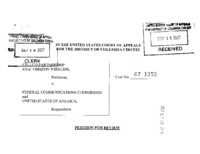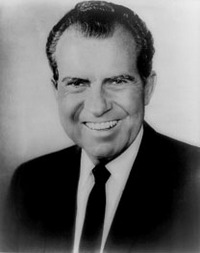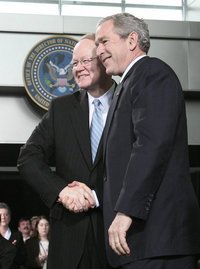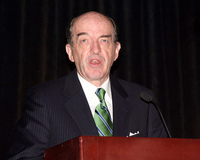 Well, even though
the FCC only provided half-measures
to open up the 700Mhz market,
Verizon thinks that’s too much and is suing the FCC
because it partly unlocked cellphones:
Well, even though
the FCC only provided half-measures
to open up the 700Mhz market,
Verizon thinks that’s too much and is suing the FCC
because it partly unlocked cellphones:
Verizon Wireless seeks judicial review on the grounds that the Report and Order exceeds the Commission’s authority under the Communications Act of 1934, as amended, 47 U.S.C. §§ 151, eg. seq., violates the United States Constitution, violates the Administrative Procedure Act, 5 U.S.C. § 701 et. seq., and is arbitrary capricious, unsupported by substantial evidence and otherwise contrary to law.Curious how the burden of proof always seems to be on anybody but the telcos and cablecos. I mean, didn’t the FCC get the memo that it was only supposed to do anything if somebody proved market failure?— Verizon Wireless v. FCC, Case No. 07-1359, U.S. Court of Appeals, D.C. Circuit, 10 Sep 2007
-jsq
PS: Seen on SavetheInternet.com
&mdash:
Net Neutrality: This is serious
by timbl (Tim Berners-Lee),
DiG,
Wed, 2006-06-21 16:35
What is net neutrality?
…
The Federal Communications Commission has just been advised by the US
department of justice, under heavy lobbying from the operators who stand
to gain from higher data charges, that a neutral net might “prevent,
rather than promote” investment and innovation. This is twaddle. An
open-access net has produced one of the greatest surges of innovation
ever recorded and has given an opportunity for people all over the world
to communicate with each other and share knowledge on equal terms. Long
may it continue to be so.
—
In praise of… a freely available internet,
Leader,
The Guardian,
Tuesday September 11, 2007
The Guardian brings up a related point:
-jsq
The authority would effectively shut down dozens of lawsuits filed against
telecommunications companies accused of helping set up the program.
The vaguely worded proposal would shield any person who allegedly
provided information, infrastructure or “any other form of assistance”
to the intelligence agencies after the Sept. 11, 2001 terror attacks. It
covers any classified communications activity intended to protect the
country from terrorism.
—
Bush Seeks Legal Immunity for Telecoms,
By KATHERINE SHRADER,
Associated Press Writer,
August 31, 2007 – 5:02 p.m. EDT
Let’s let President Nixon sum it up:
Yet the same administration can’t be proactive about
effective regulation of first-mile Internet access for effective competition.
-jsq
Suppose the telcos and cablecos get everything they want.
To buy a BBQ grill on eBay, you’ll have to pay for the eBay channel.
This is above whatever you pay the seller for the grill or
eBay for your membership.
You’ll have to pay your local Internet access company
just to let you get to eBay to participate in the auction.
Oh, maybe you’ll be able to get there anyway, but your
access may be so slow that you’ll pay for the eBay channel
out of frustration.
If you want to buy a book from Amazon, you’ll have to pay for the
Amazon channel.
For search you’ll need the Yahoo channel or the ask.com channel or the
google channel.
Assuming your favorite search engine is even offered as a channel.
Many smaller services probably won’t be.
Maybe it won’t be quite this bad.
Continue reading
Accelerating broadband speed in this country — as well as in South
Korea and much of Europe — is pushing open doors to Internet innovation
that are likely to remain closed for years to come in much of the
United States.
The speed advantage allows the Japanese to watch broadcast-quality,
full-screen television over the Internet, an experience that mocks the
grainy, wallet-size images Americans endure.
—
Japan’s Warp-Speed Ride to Internet Future,
By Blaine Harden,
Washington Post Foreign Service,
Wednesday, August 29, 2007; Page A01
—
Transcript: Debate on the foreign intelligence surveillance act,
By Chris Roberts, ©El Paso Times,
Article Launched: 08/22/2007 01:05:57 AM MDT
Finally, congressional investigations and hearings are now expected to look at a key provision of federal mining law, one which requires the U.S. Government to be the main communicator when an accident occurs.
ABC News now notes it took the mine safety administration two days to take public control of the Crandall Canyon Mine.
ABC also adds, “Others were irate that [mine owner Bob] Murray was allowed to publicly predict success and contradict MSHA itself while agency officials quietly looked on.”
—
Federal mine safety official’s credentials questioned,
Chris Vanocur,
ABC 4 News,
Last Update: 8/20 2007 8:00 pm
The stakes going forward are even higher, including
economic competitiveness,
control of information,
and
political discourse and with it the survival of a political system.
At least the traditional media finally noticed the problem with the appointment
of the Mine and Health Safety Administrator.
Imagine if we had more proactive investigative media
that might have actually noticed his appointment when it happened.
And imagine if we had none, which is a very real possibility
with continuing media consolidation and increasing control
over the Internet by a very small number of companies.
-jsq
—
FCC Commissioner: US playing “Russian roulette with broadband and Internet”
By Nate Anderson, ars technica, August 03, 2007 – 09:20AM CT
—
Municipal broadband in France,
by Esme Vos,
MuniWireless,
at 7:42 PM on September 5, 2005
Apparently so:
—
Some French muni BB inspiration to Maybe Rep’s Boucher & Upton?
Dirk H. van der Woude,
Interesting People,
5 August 2007
-jsq
When I invented the Web, I didn’t have to ask anyone’s permission.
 One sentence sums it up:
One sentence sums it up:
When I invented the Web, I didn’t have to ask anyone’s permission.
That’s Internet freedom.
That’s why we need net neutrality.
If I pay to connect to the Net with a certain quality of service, and
you pay to connect with that or greater quality of service, then we can
communicate at that level.
Where you and I are any pair of participants on the Internet.
Continue reading
Twaddle v. a Wonder of the World
 It’s good to see a newspaper not mince words:
It’s good to see a newspaper not mince words:
A free-for-all web (after normal monthly broadband charges have been
paid) is one of the wonders of the world and a binding force for all
communities.
It has only become an issue because the US Congress is scrutinising the
question of “net neutrality”, though why the US authorities – rather than
an international body – should deem themselves to have jurisdiction over
the internet is not clear.
The usual answer to that is that
a properly constituted international body would do even worse.
Although nowadays, it seems the otherwise unlateralist U.S. government
is toeing the (pseudo-)capitalist international party line.
Intended vs. Legal
 Shortly after
a high level U.S. official acknowledged that
telephone companies have helped the government in illegal spying,
this comes out:
Shortly after
a high level U.S. official acknowledged that
telephone companies have helped the government in illegal spying,
this comes out:
WASHINGTON — The Bush administration wants the power to grant legal
immunity to telecommunications companies that are slapped with privacy
suits for cooperating with the White House’s controversial warrantless
eavesdropping program.
Well, when the president does it that means that it is not illegal.
The Amazon Channel
 It’s all very well to talk about net neutrality or Internet freedom
and how it affects 700Mhz spectrum sales or freedom of the press.
But what does all this have to do with the average Internet user?
It’s all very well to talk about net neutrality or Internet freedom
and how it affects 700Mhz spectrum sales or freedom of the press.
But what does all this have to do with the average Internet user?
Warp Speed From Behind
 As we’ve mentioned before
Japan has Internet connections much faster than those in the U.S.
This point is getting more mainstream media play:
As we’ve mentioned before
Japan has Internet connections much faster than those in the U.S.
This point is getting more mainstream media play:
Broadband service here is eight to 30 times as fast as in the United
States — and considerably cheaper. Japan has the world’s fastest Internet
connections, delivering more data at a lower cost than anywhere else,
recent studies show.
So is it just for video?
If so, maybe we’d better let the telcos have their way.
Continue reading
Duopoly Spies
 Well, I had been waiting to post something about the telcos and domestic
wiretapping until more news came out, since much of it was still hearsay.
But now National Intelligence Director and former National Security Agency
Director Mike McConnell has confirmed it:
Well, I had been waiting to post something about the telcos and domestic
wiretapping until more news came out, since much of it was still hearsay.
But now National Intelligence Director and former National Security Agency
Director Mike McConnell has confirmed it:
Now the second part of the issue was under the president’s program,
the terrorist surveillance program, the private sector had assisted
us. Because if you’re going to get access you’ve got to have a partner
and they were being sued. Now if you play out the suits at the value
they’re claimed, it would bankrupt these companies. So my position was
we have to provide liability protection to these private sector entities.
Ryan Singel points out in Wired’s Threat Level blog that
this is even though the same McConnell signed a sworn declaration in April
saying to reveal that NSA and Verizon had such a relationship
“would cause exceptionally grave harm to the national security.”
Continue reading
Heck of a Job, Stickler
What practical difference does it make when a president appoints
political commissars as heads of departments and agencies, enforcing ideologicallines instead of doing their job?

Also coming to light, is the fact that Stickler’s nomination to head the mine administration was twice rejected by congress and rejected when republicans were still in charge.
Rejected reportedly by senators who were concerned about Stickler’s safety record when he operated mines.
After his nomination was twice rejected by the Senate, President Bush gave Richard Stickler the mine safety job with a recess appointment.
That’s a presidential appointment made when congress is not in session.
Dead people in mines.
Dead people in Hurricane Katrina.
Postal rate hikes for small publications.
Wireless spectrum handed over to a few big companies.
And of course massive consolidation of first mile Internet ISPs
in the hands of companies that aren’t delivering on their promises
and that indulge in
repeated political censorship
while cooperating with the government in wiretapping.
Russian Roulette
 FCC Commissioner Michael Copps has a way with words.
Last year he said we should be talking about
Internet freedom rather than net neutrality.
And now he says we’re
FCC Commissioner Michael Copps has a way with words.
Last year he said we should be talking about
Internet freedom rather than net neutrality.
And now he says we’re
playing Russian roulette with broadband and Internet and more traditional media
And
the Russians are winning.
Continue reading
French FttH
 In the U.S.,
it’s difficult for a municipality to put up
a wireless Internet service even if it’s a disaster zone
and the telco hasn’t gotten its POTS service back up,
because the duopoly doesn’t want the competition.
Meanwhile, in France:
In the U.S.,
it’s difficult for a municipality to put up
a wireless Internet service even if it’s a disaster zone
and the telco hasn’t gotten its POTS service back up,
because the duopoly doesn’t want the competition.
Meanwhile, in France:
Municipalities, cities, states, territories and regions are driving the
French municipal (wireless and wired) broadband uptake as newly authorized
by law. A new article of French “code général des communications”
passed in June 2004 (law ref code is L-1425-1) gives these public entities
the following rights :
The municipality does have to demonstrate that there isn’t already
a similar service, but given the “open networks” aspect, that shouldn’t
be difficult.
Could this have something to do with why France is ahead of the U.S.
in Internet connectivity and speed?
Nowadays there are over a hundred projects, small and big. One famous one
One famous one is the plan to do FttH in Hauts-de-Seine, the department
chaired by Mr Sarkozy until he became President.
Sarkozy was the man personally proprosing the FttH
roll out in Hauts de Seine.
He points out that picture FCC Commisioner Tate
and ARCEP Commissioner Gauthey have met, as in the picture.
Perhaps soon we’ll get a U.S. president who might be influenced
by French president Sarkozy on this subject.